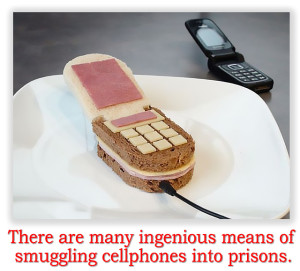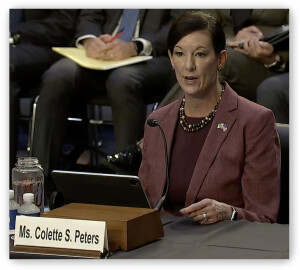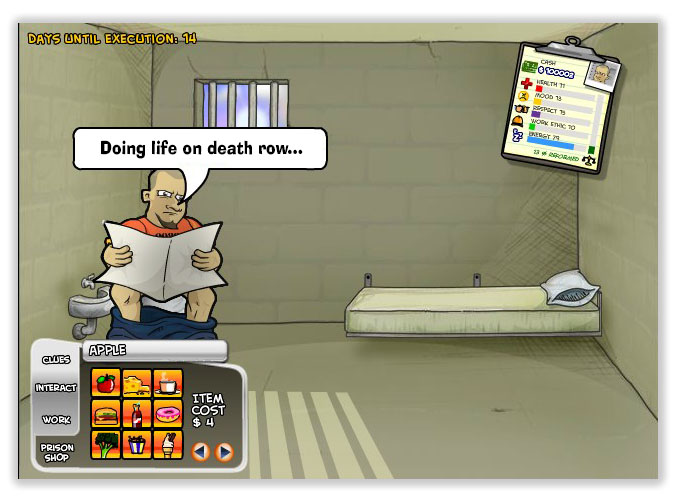We post news and comment on federal criminal justice issues, focused primarily on trial and post-conviction matters, legislative initiatives, and sentencing issues.

BOP SHORTS
 Cotton Introduces Bill to Jam Cellphones: Sen Tom Cotton (R-AR) and Rep David Kustoff (R-TN) have introduced companion bills in the House and Senate to permit prisons to use cellphone jamming devices to block prisoners from using contraband cellphones.
Cotton Introduces Bill to Jam Cellphones: Sen Tom Cotton (R-AR) and Rep David Kustoff (R-TN) have introduced companion bills in the House and Senate to permit prisons to use cellphone jamming devices to block prisoners from using contraband cellphones.
The Republican lawmakers are reintroducing identical legislation in their respective chambers of Congress that would amend § 302a(a) of the Communications Act of 1934 – which lets the Federal Communications Commission regulate “devices which in their operation are capable of emitting radio frequency energy by radiation, conduction, or other means in sufficient degree to cause harmful interference to radio communications” – to prohibit the FCC from banning cellphone jammers used in prison housing units.
Currently, the FCC says, “The Communications Act prohibits non-Federal entities from using cell jammers. The FCC cannot waive this statutory prohibition absent a change in the law by Congress.” The Cotton-Kustoff bill is intended to solve this problem, stating that the FCC “prevent a State or Federal correctional facility from operating a jamming system within the correctional facility to prevent, jam, or otherwise interfere with a wireless communication that is sent” by a contraband cellphone.
In announcing the bill, Cotton trotted out the overused refrain that “[f]or far too long, contraband cellphones have been a major security threat in our prisons, allowing criminals to coordinate crimes from behind bars. This legislation is a common-sense step to cut off their ability to threaten witnesses, organize drug trafficking, and endanger law-abiding citizens from within prison walls.” While there are instances of such crimes, the numbers pale next to cellphones’ real utility, to let prisoners get past telephone time and availability limitations on communications with friends and family.
Walter Pavlo described the phenomenon:
The risk of possessing and using a cell phone is something many prisoners wrestle with when they are in prison, but it is also a symptom of other problems in prison. It begs the question as to why prisoners take the extraordinary risk of having a cell phone. Federal prisoners are subject to lockdowns in prison where they are confined to their cells and not allowed to use sanctioned methods of communication like monitored calls and emails (Corrlinks, the prison email system, tracks and reads email messages). Lockdowns occur because of staff shortages or because of disturbances in the prison. Some of these lockdowns can last days, weeks or months. During lockdowns there is no television, no phone, no email and no visitation. In this isolation, prisoners long for some communication with the outside world, to talk to their family, to get some news, and to have some entertainment in stark confines of prison. The cell phones offer an escape from prison.
 As a result, prison cellphones are at the heart of booming commerce: someone who has invested the $2,000 to $3,000 needed for a cellphone can then rent it out to other prisoners, who often have their own sim cards to insert into the phone. Pavlo said, “A cell phone can be purchased by a prisoner for up to $3,000 and to cover the costs many are rented out to other prisoners for prices of $100-$200/hour, a price mostly determined by the number of phones in the prison. When cell phone inventory is high among the general population, prices tend to go down.”
As a result, prison cellphones are at the heart of booming commerce: someone who has invested the $2,000 to $3,000 needed for a cellphone can then rent it out to other prisoners, who often have their own sim cards to insert into the phone. Pavlo said, “A cell phone can be purchased by a prisoner for up to $3,000 and to cover the costs many are rented out to other prisoners for prices of $100-$200/hour, a price mostly determined by the number of phones in the prison. When cell phone inventory is high among the general population, prices tend to go down.”
Cellphone jamming unit prices currently range from about a hundred to several thousand dollars a unit, but with demand, the price would probably drop.
![]()
Transgender Injunction: A judge last week ordered the Bureau of Prisons to transfer two transgender inmates back to women’s prisons after they had been sent to male facilities due to Trump’s executive order withdrawing transgender protections.
U.S. District Judge Royce Lamberth (District of Columbia) issued a preliminary injunction in a suit over the impact of Trump’s executive order on transgender women in federal prisons.
Lamberth ordered the BOP to “immediately transfer” the two – identified in court papers as “Rachel and Ellen Doe” – back to women’s facilities and to continue to provide them with gender dysphoria treatment.
The inmates said in court papers that they were living in constant fear of sexual assault and violence after being moved to male prisons.
![]()
 Colette Peters Lands on Her Feet: With inmate suicide rates in the California state prison system at an all-time high, Senior U.S. District Judge Kimberly Mueller (Eastern District of California) last week appointed former BOP Director Colette Peters as a “receiver-nominee” to develop an oversight plan for psychiatric services for California’s prison population intended to address the epidemic.
Colette Peters Lands on Her Feet: With inmate suicide rates in the California state prison system at an all-time high, Senior U.S. District Judge Kimberly Mueller (Eastern District of California) last week appointed former BOP Director Colette Peters as a “receiver-nominee” to develop an oversight plan for psychiatric services for California’s prison population intended to address the epidemic.
Peters was fired from her BOP position on January 20th within hours of Trump being sworn in as President. She has since filed with the Merit Systems Protection Board claiming that she was improperly fired.
![]()
Concerns Over BOP Pay Cuts: Sens Richard Durbin (D-IL), Cory Booker (D-NJ), Adam Schiff (D-CA), and 12 others wrote to Attorney General Pam Bondi last Friday expressing “deep[] concern” over BOP plans to cut retention pay by 50 percent at 42 facilities and eliminate it outright at seven others.
 Last month, 23,000 BOP employees were notified of the retention bonus change, effective Mar 23. The letter notes that the BOP “is already grappling with extreme understaffing at BOP institutions… Understaffed prisons already face immense challenges in keeping current populations and staff safe, ensuring access to necessary medical and dental care, and fully implementing the First Step Act in order to reduce recidivism risk and promote public safety… Reducing and eliminating staff retention incentives are certain to exacerbate staffing shortages.”
Last month, 23,000 BOP employees were notified of the retention bonus change, effective Mar 23. The letter notes that the BOP “is already grappling with extreme understaffing at BOP institutions… Understaffed prisons already face immense challenges in keeping current populations and staff safe, ensuring access to necessary medical and dental care, and fully implementing the First Step Act in order to reduce recidivism risk and promote public safety… Reducing and eliminating staff retention incentives are certain to exacerbate staffing shortages.”
Newsbreak, Prisons could use cellphone jamming systems under bill in Congress (March 27, 2025)
Press Release, Cotton, Kustoff Introduce Bill to Keep Cellphones Out of Jails (March 26, 2025)
Forbes, Federal Prisoner’s Dilemma, Cell Phone Or Not (June 7, 2024)
Associated Press, Judge orders Trump administration to return two transgender inmates to women’s prisons (March 19, 2025)
Corrections1, Former BOP director named to lead overhaul of Calif. prison mental health system (March 21, 2025)
Sen Richard Durbin, Letter to Attorney General (March 21, 2025)
– Thomas L. Root










